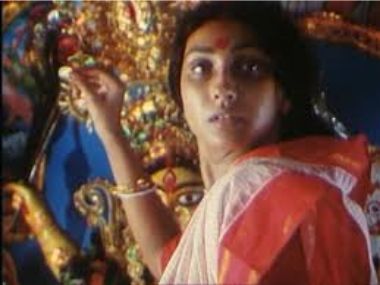Rituparno Ghosh’s poignant family drama Utsab heralded the new millennium with glorious promises for the Bengali film industry. Released 20 years ago today, Utsab came at a time when the region’s cinematic aesthetic had reached new lows, mired between crass commercial features and religious drawls in mythological films. Only Ghosh’s sixth film in a rather small repertoire, Utsab was a true mouthpiece for dwindling traditions, urbane influxes and an entire community’s desperate attempt at holding onto the dying embers of “what’s been.” The film’s narrative was placed comfortably amidst the rajbari (palace) of an erudite Bengali family, preparing for the year’s annual Durga festival. The sons and daughters of the household congregated from various parts (some from the city, while others from the US) to rejoice in the seemingly important event. Throughout the film, Ghosh utilised representational strategies to visualise the Pratima (deity) as a paradigm of time, memory, and corporeal identity for a once-prosperous family forced to cope with the demands of modernity. Utsab wove its way through the tensions of living up to the gravitas of ancestry and lineage, while blurring the boundaries between propriety and norm. [caption id=“attachment_8188931” align=“alignnone” width=“1200”] Still from Utsab with Rituparna Sengupta and Prasenjit Chatterjee. Image from Facebook[/caption] Through their interpersonal feud and familial dynamics, Ghosh’s characters dissected the hypocrisy, pain, love, and sacrifice that an entire generation was experiencing at the time, questioning where they stood as liberal thinkers in a world that commodified love. Thematically also, Ghosh took on huge challenges. Extramarital affairs, incest, domestic abuse — everything was neatly packaged in an overarching canopy of strong, feminist voices. But Ghosh never crossed obvious boundaries to depict what he was trying to say. Subtle glances, stifled sighs, and tearful silences did the job. The tension in the film developed gradually, finding its conduit with a mid-way climax. All the crucial characters exposed their vulnerabilities beautifully through the course of the film. The family’s favourite daughter Parul (played by the brilliant Mamata Shankar), a self-assured and sensible woman, finally broke down to confess what a pathetic marriage she had been in. The second son Nishit (Bodhisattva Mazumdar) disclosed that he had been laid off from his high-flying corporate job and the youngest daughter Keya (Rituparna Sengupta) came clean about her husband Arun’s (Prasenjit Chatterjee) alcoholism and their consequent financial distress. On a closer look, all these revelations had a clear build-up, with Ghosh leaving minute breadcrumbs of clues strewn throughout the plot. It then became clear why Parul’s husband was absent from such an important occasion in the household. Her palpable annoyance with the rest of the family was obvious in hindsight, since they had forced her into the marriage. Nishit’s inane jibes at traditional ways of living could only then be a defence mechanism for his growing financial insecurities. Keya’s hesitation with the house elders and her need to remain away from the familial radar only came across as a desperate attempt at masking her dwindling marriage despite her affection for Arun. Main story aside, Ghosh stitched parallel narratives that explored uncharted territories. The film was one of the first modern Bengali works to depict incest. A brewing romance between first cousins Joy (Ratul Shankar Ghosh), Parul’s son and Shompa, (Arpita Chatterjee) Nishit’s daughter, was one of the main talking points after the film’s release. Through his characters’ crises and consequent solutions, Ghosh represented the issues of several such families, closeted within rigid societal structures, unable to come out and address their shortcomings. Within Utsab’s languid pace, the filmmaker quietly sowed the seeds of a socio-cultural revolution. Utsab marked the turn of the century not only with its well-placed release in 2000, but also with the ideologies that the film advocated — of free love and importance of familial bonds. But the beauty of Ghosh lay beneath the fact that he never imposed this emancipation. Through Utsab, he illustrated a family’s coming-of-age journey, but the paths that they chose to walk on, were their own. Similarly, the filmmaker imbued within his characters a charged sense of belonging. His modernisation never challenged the older ways or criticised it, but merely held up a mirror for reflection, and provided a nudge towards the future. Much like Ma Durga’s emergence, signifying hope and prosperity, Utsab dealt with a family’s, and thereby Bengal’s advent into the new age, where her people had the option of selecting what legacies to hold on to, and discarding the ones they deemed archaic.
Only Rituparno Ghosh’s sixth film in a rather small repertoire, Utsab was a true mouthpiece of Bengal grappling with modern times
Advertisement
End of Article
Written by Shreya Paul
A Theory of Communications enthusiast still learning social skills. Forever curious about the effects of good food on grumpy people. see more


)
)
)
)
)
)
)
)
)



